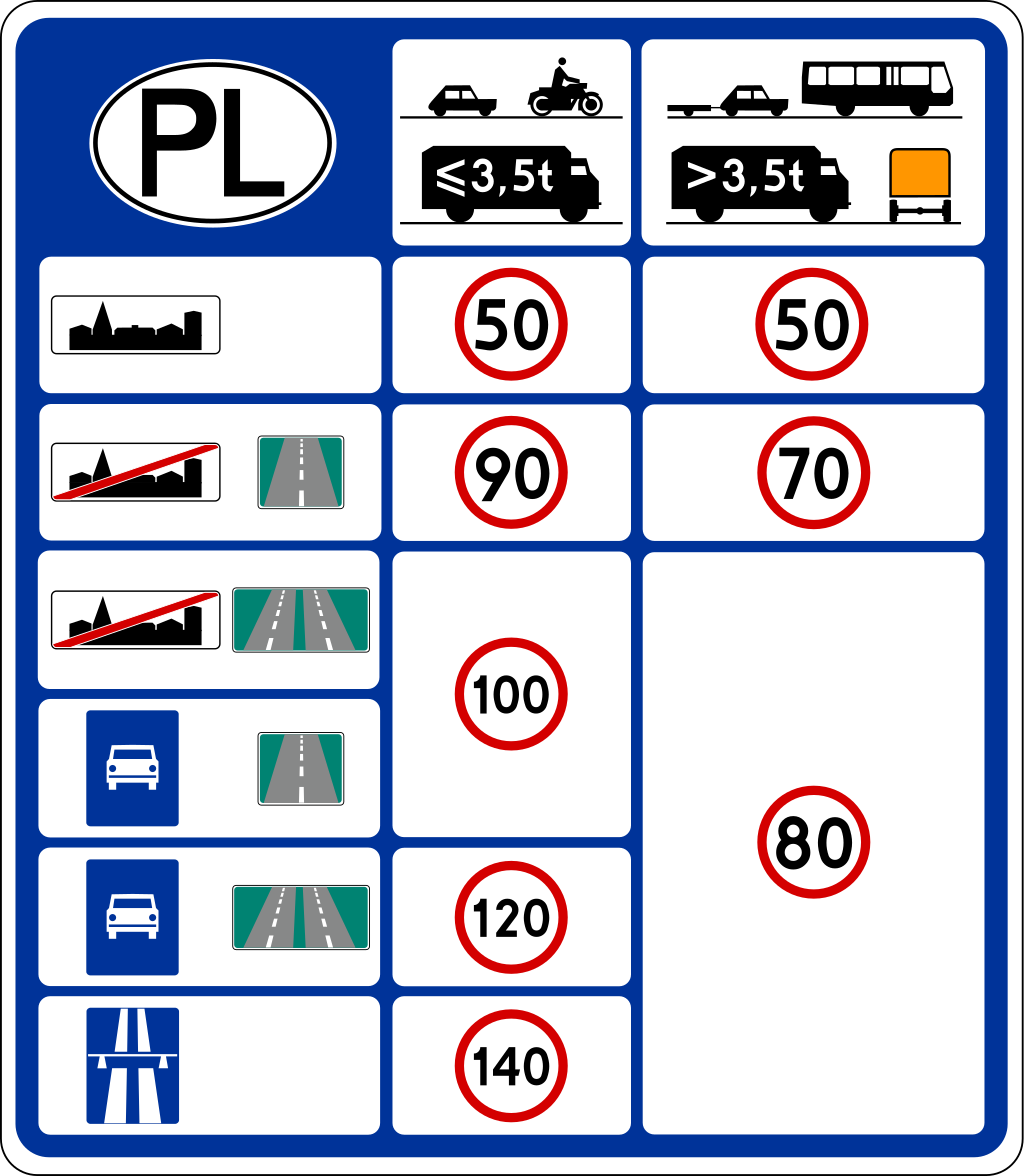Practical Information
Here are some practical tips for those traveling with a caravan or motorhome.
Customs & Road Fees | ||
General Traffic Rules | ||
Road System | ||
Parking Rules | ||
Speeding Violations | ||
Health and Accident Insurance |
Customs duties and road tolls
01Customs stations
<<< here>>> find a list of contact details for customs stations along the main roads and border crossings
02Border crossings
<<< here >>> you can find the current status of border crossings between neighboring countries outside the EU
03 Toll roads
<<< here you can >>> find a list of roads and highways that are tolled for motorhomes and caravans (select "Show tolled roads"). Tolls on these roads apply only to vehicles with a total weight of 3.5 tons or more.
04Pricing structure
<<< here >>> you can find current information on how road tolls are calculated (e.g., depending on vehicle type, weight, number of axles
To calculate the cost depending on road type, vehicle type, weight, etc., visit ”calculator”
05Payment system
Information on how to pay road tolls, including details about the e-vignette system and where to purchase them (e.g., online, at the borders, gas stations).
>>> OBU* and ESL*-verktyg <<< (on the website, you can find the complete list of operators throughout Poland where you can obtain the tool. In the specification at the bottom of the website, there is detailed information about the type of tool)
* OBU (On Board Unit) and ELS (External Localization System)
Driving rules and safety
01Speed limits
Specific speed limits for motorhomes and caravans with a total weight exceeding 3.5 tons on highways, country roads, and in cities.
In cities: 50 km/h.
On country roads: 70-80 km/h.
On highways: 80 km/h.

02Blood alcohol limits
The allowed blood alcohol limit for drivers is 0.02%.
03Lights
The use of headlights is mandatory at all times.
04Mandatory documents
Valid ID or passport (with a valid visa for non-EU citizens)
Valid driver's license (international driver's license recommended) Original vehicle registration certificate
Insurance (Green Card recommended as proof of valid motor insurance)
05Mandatory car equipment
All vehicles must be equipped with an easily accessible fire extinguisher, warning triangle, and spare bulbs. A reflective vest is mandatory to have and use in emergencies outside the vehicle. Additionally, a first aid kit should be in the car. It's also advisable to have the phone number of the towing service.
06Studded tires
Studded tires are prohibited in Poland. If you are stopped by Polish police, you risk having to remove the studs on the spot or obtain stud-free tires. Additionally, you will be fined. It does not help to say that you are on your way to a country where studded tires are allowed.
Winter tires are not mandatory.
Highways
The road system
Poland's highways (Autostrady) are marked with the letter "A" followed by a number, for example, A1, A2, A4.
Expressways (Drogi Ekspresowe) are marked with the letter "S" followed by a number, for example, S3, S8.
Speed limits
For motorhomes and caravans under 3.5 tons:
On highways: 140 km/h
On expressways: 120 km/h
For motorhomes and caravans over 3.5 tons, lower speed limits generally apply. (See details in the section on: Driving Rules and Safety)
Highway tolls
Some highways in Poland are tolled. There are two main ways to pay the tolls.
- Manual toll booths at highway entrances:
Here you pay with cash or card. - Electronic payment systems::
Vehicles under 3.5 tons can use a mobile application Autopay
Download the app from:
App Store
Google PlayeTOLL is the electronic toll system for vehicles over 3.5 tons >>> read more <<<
Cost
The tolls vary depending on the highway and the vehicle category (car, motorhome, caravan, etc.). They can range from a few zlotys to several dozen zlotys for longer distances.
Highways
In Poland, there are several highways that are subject to tolls.
Here is an overview of the main highways:
A2Toll Highway A2 (Konin – Świecko)
The highway between Konin and Świecko, managed by Autostrada Wielkopolska, will unfortunately not be toll-free in 2024. Drivers will have to account for tolls, which can be particularly significant given the cost of driving this route.
A4 Toll Highway A4 (Katowice – Kraków)
The stretch between Katowice and Kraków, managed by Stalexport, will not receive any toll reductions in 2024. The government's decision not to abolish the tolls means that drivers will still have to pay to use this road.
A2 Free Highway A2 (Stryków – Konin)
On the 100-kilometer stretch between Stryków and Konin, free passage continues for vehicles up to 3.5 tons. The e-TOLL system still applies, but light vehicles do not need to undergo any additional formalities to receive this benefit.
A4Free Highway A4 (Wrocław – Sośnica)
On the 162-kilometer stretch between Wrocław and Sośnica, managed by GDDKiA, no tolls will be charged for passenger cars and vehicle combinations up to 3.5 tons. The e-TOLL system registers entry on this stretch.
A1Free Highway A1
(Rusocin – Toruń)
The government has confirmed that the stretch between Rusocin and Toruń remains free for two-axle vehicles up to 3.5 tons and motorcycles. Despite the maintained free passage, drivers must still obtain a ticket or authorize entry via a visual system, which generates a so-called zero ticket that is not charged by the operator AmberGO. The e-TOLL system still applies.
Additional information
The latest information about the traffic situation on these highways can be found here:
4. Specific rules for caravans and motorhomes
General rules
Official campsites
There are approximately 250 campsites in Poland, of which about half are certified and meet specific standards. These campsites typically offer 24-hour reception, security surveillance, sanitary facilities, and sometimes even recreational activities such as fishing and water sports.
Wild camping
Wild camping is not prohibited in Poland. Under certain circumstances, you can spend the night in your motorhome or caravan in public places as long as there are no specific prohibitions against it. It is forbidden to wild camp on beaches, in forests, and rural areas, as long as the land is not private property and there are no signs prohibiting camping.
It is always best to use official campsites or designated areas to avoid fines and problems with the locals.
Private land
It is allowed to park and spend the night on private land with the owner's permission!
Parking rules
Urban areas
In many cities, it is allowed to park motorhomes and caravans in regular parking spaces, provided the vehicle fits within the marked lines and there are no specific signs prohibiting the parking of such vehicles.
Parking signs
It is important to follow local traffic signs that may indicate restrictions for parking motorhomes and caravans, such as prohibitions against overnight parking or restrictions for vehicles over a certain length or weight.
Private parking areas
Parking on private land requires permission from the landowner. It is illegal to park on private property without permission, and this can lead to fines or the vehicle being towed.
Restrictions on maximum parking periods
n some public parking areas, there may be restrictions on how long a motorhome or caravan can be parked. This can vary from a few hours to several days depending on local regulations.
Weight restrictions
Some parking spaces have restrictions for vehicles over a certain weight, which can affect larger motorhomes and caravans.
Overnight parking
In some areas, overnight parking is prohibited or restricted to specific times or places. It is important to check local regulations for overnight parking.
Overnight stay regulations
Rest areas and highways
Along highways, there are special rest areas where overnight stays may be allowed. However, it's important to check local regulations as they can vary depending on the region.
Cities and residential areas
In many cities, it is prohibited to overnight in a motorhome on streets or public parking areas. Some cities may have specific areas where overnight parking is allowed, so it's important to check signs and local regulations.
Website
To avoid problems and ensure a comfortable trip, it is recommended to use apps and websites that help find legal parking and overnight spots. Feel free to browse carefully through campsitesinpoland.com campsitesinpoland.com - we provide you with updated information.
Fines and penalties
Speeding violations
- Up to 10 km/h over the limit: 50 PLN and 1 penalty point
- 11-15 km/h over: 100 PLN and 2 penalty points
- 16-20 km/h over: 200 PLN and 3 penalty points
- 21-25 km/h over: 300 PLN and 5 penalty points
- 26-30 km/h over: 400 PLN and 7 penalty points
- 31-40 km/h over: 800 PLN (1600 PLN for repeat offenses) and 9 penalty points
- 41-50 km/h over: 1000 PLN (2000 PLN for repeat offenses) and 11 penalty points
- 51-60 km/h over: 1500 PLN (3000 PLN for repeat offenses) and 13 penalty points
- 61-70 km/h over: 2000 PLN (4000 PLN for repeat offenses) and 14 penalty points
- 71 km/h or more over: 2500 PLN (5000 PLN for repeat offenses) and 15 penalty points.
Other common offenses
- Use of mobile phone while driving: 500 PLN
- Failure to wear a seatbelt: 100 PLN
- Illegal overtaking: 1000 PLN
- Transporting children without appropriate safety equipment: 300 PLN
- Driving without a valid driver's license: 1500 PLN
Payment of fines
Fines can be paid in the following ways:
On the spot: Cash or card, if the police have a terminal available.
Credit fine: Most common, to be paid within 7 days.
Remote fine: Sent to the driver's home, to be paid within 14 days if the driver was not present at the time of the offense, such as in the case of speed camera enforcement.
Appeals and penalties
If the driver does not accept the fine, the case can be brought to court, where the fines can either be confirmed or increased. The maximum fine that can be imposed by a court is 30,000 PLN, depending on the seriousness of the violation.
Knowing and following these rules is crucial to avoid penalties and to ensure road safety in Poland.
Insurance
Healthcare and medical treatment
Covers costs for doctor visits, hospital care, medications, and any necessary medical evacuations. Don't forget to bring your European Health Insurance Card issued by the Social Insurance Agency in your country!
Accident insurance
Protects against costs related to accidents, including emergency care and long-term treatment.
Liability insurance
It protects you against legal costs and compensation claims if you cause damage to someone or someone else's property.
Travel insurance for specific activities
If you plan to participate in risky activities such as skiing, water sports, or hiking in remote areas, it may be wise to purchase additional insurance that covers these activities.

















